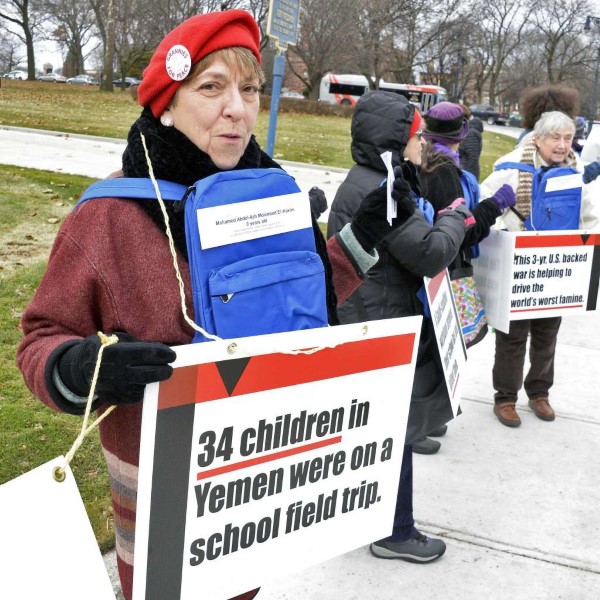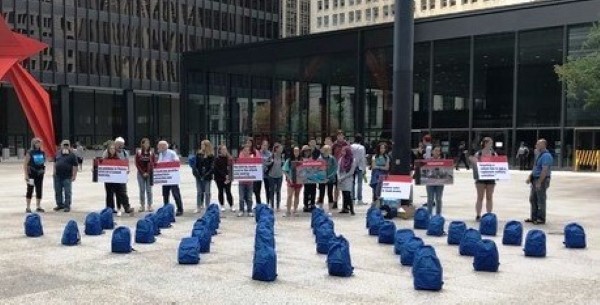
며칠 전, 나는 ‘희망의 학교(The Hope School)’를 꾸려가고 있는 제주의 친구들이 준비한 특별한 스카이프 모임에 함께 했다. 제주에 있는 이 학교는 제주도민과 한국에 피난처를 찾고자 최근 제주도에 온 예멘인들을 위한 배움의 공동체를 만들어가고 있다.
비자면제지역인 제주도는 안전을 찾아 거의 5000마일을 떠나온 500여명의 예멘인들의 입국 지점이 되었다. 계속되는 폭탄, 투옥과 고문의 위협, 기아의 공포로 인해 상처 입은 예멘 이주민들에는 아이들이 포함되어 있으며, 이들은 한국에서 머물며 피난할 수 있기를 간절히 원하고 있다.
예멘을 떠난 다른 수천 명의 사람들이 그러했듯 이들은 자신들의 가족들과 이웃들, 그리고 그들이 한때 꿈꿨던 미래를 그리워하고 있다. 그러나 지금 예멘으로 돌아가는 것은 그들에게 끔찍하게도 위험한 것이리라.
제주도에 사는 많은 이들에게 한국에서 피난처를 찾는 예멘인을 환영하거나 거부하는 것은 매우 어려운 문제로 여겨지고 있다. 용감하고 강렬한 평화 운동으로 알려진 강정마을에 기반을 두고 있는 ‘희망의 학교’ 운영자들은 한국과 예멘 양국의 젊은이들이 서로의 역사와 문화, 언어들을 더 잘 이해하고 서로를 더 잘 알 수 있는 환경을 만들어, 새로이 온 예멘인들이 한국에서 환대의 경험을 할 수 있기를 바라고 있다.
희망학교를 지지하는 사람들과 예멘인들은 정기적으로 모여 서로의 것들을 교환하고 배우는 시간을 갖는다. 그들의 커리큘럼은 무기나 위협, 힘에 기대지 않고 문제를 풀어가는 것에 대한 것이다. “제주에서 예멘을 보다” 스카이프 모임에서 나는 미국에서 예멘의 전쟁을 멈추기 위한 풀뿌리 운동은 어떠한지에 대해 이야기 해달라는 요청을 받았다. 나는 Voices(목소리들)이 미국의 여러 도시들에서 예멘의 전쟁에 대한 시위들을 준비하는데 도움을 주었으며, 우리가 참여한 다른 전쟁반대 캠페인들과 비교해볼 때 예멘전쟁으로 인한 고통과 굶주림을 다루기 위한 미국 내 주류 언론들의 의지들을 예외적으로 볼 수 있었다고 말했다.
언론인인 한 예멘인 참가자는 크나큰 좌절감을 표출했다. 위험에 처한 그와 그의 동료들을 내가 얼마나 이해할 수 있었을까? 예멘에서 Houthi 전투원들(반군)은 언제든지 그를 공격할 수 있었다. 그는 사우디와 UAE의 전투기에 의해 폭격당할 수도 있었다. 사우디와 UAE가 자금을 제공하고 조직한 용병전투기가 그를 공격했을 수도 있었다. 그는 미국이나 호주와 같은 서방 국가들에 의해 조직된 특수 작전 부대들에도 마찬가지로 공격당할 수 있었다. 뿐만 아니라 그의 고국은 자원을 통제하고자하는 강대국들에 의해 착취당할 수도 있다. 그는 “우리는 큰 게임에 잡혀있다”고 말했다.
예멘에서 온 또 다른 젊은이는 지금의 예멘 전쟁의 모든 그룹들로부터 그곳에 사는 모든 사람들을 보호할 예멘의 군대를 상상한다고 말했다.
이 이야기를 들으며 나는 나의 젊은 한국 친구들이 무장 투쟁과 그들의 섬의 군사화 문제에 얼마나 반대했는지를 떠올렸다. 시위, 단식, 시민불복종, 투옥, 행진, 그리고 연대를 구축하기 위한 집중적인 캠페인들을 통해 그들은 수년 동안 한국과 미국 군국주의의 공격에 저항하기 위해 고군분투해 왔다. 그들은 전쟁과 이로 인한 혼돈이 사람들을 어떻게 분열시키고 착취와 약탈에 더욱 취약하게 만드는지를 잘 알고 있다. 그럼에도 그들은 이 희망 학교의 모든 이들이 목소리를 내고, 들으며, 존중하는 대화를 경험하기를 간절히 원하고 있다.
예멘의 복잡한 현실을 이해하고 미국의 예멘전쟁 참여를 끝내기 위해 미국의 풀뿌리 공동체를 개발하는 방법은 무엇일까? ‘희망의 학교’를 조직한 친구들이 취한 행동은 소중한 본보기가 된다. 그러나 이 같은 고민과는 별도로 우리는 당장 모든 전쟁 당사자들에게 즉각적인 휴전을 촉구하고 모든 항구와 도로를 개방하게 해야 한다. 그리하여 식량, 의약품 및 연료를 절실히 필요로 하는 곳에 분배될 수 있게 해야 한다. 그리고예멘의 황폐화된 사회제반시설과 경제를 회복시키는데 도움을 주어야 한다.

2018년 8월 9일 학교 통학버스를 목표물로 삼은 500파운드의 록히드 마틴(Lockheed Martin) 제조 미사일로 인해 40명의 어린이들이 희생당했다. 이 아이들을 추모하기 위해 미국의 많은 지역에서 활동가들은 40개의 가방을 전시했다.
8월 9일의 죽음이 있기 전에 아이들은 유니세프에서 준비한 파란색 가방을 받았다. 그 가방은 그들 가족들의 생존을 도울 백신과 다른 귀중한 것들로 가득 찬 것이었다. 폭탄테러로 인해 중단되었던 수업이 몇 주 전에 다시 시작됐을 때, 이 끔찍한 폭탄 테러에서 살아남은 아이들은 피가 묻은 가방을 매고 학교로 돌아왔다. 이 아이들이 더 나은 미래를 찾을 수 있도록 실질적인 보살핌과 ‘조건 없는’ 관대한 투자 형태의 보상이 절실히 필요하다. 그들에게 역시 ‘희망의 학교’가 필요하다.

전쟁이나 기아를 통해 사람들을 죽이는 것으로는 결코 문제를 해결할 수 없다. 나는 이것을 강력하게 믿는다. 그리고 나는 무장한 엘리트들이 자신의 부를 늘리기 위해 정기적으로 또 고의적으로 이라크, 아프가니스탄, 시리아, 가자 지구 및 기타 그들이 값비싼 자원을 통제하고자하는 땅에 분열의 씨앗을 뿌리고 있다고 생각한다. 전쟁으로 인해 분열된 예멘에서 사우디아라비아, 아랍 에미리트 연방, 그들의 연립 파트너 및 미국은 그들의 이익을 위해 예멘의 풍부한 자원을 착취할 수 있다.
전쟁이 격해져 가는 가운데, 고통에 속에서 울부짖는 모든 소리에 귀 기울여야 한다. 희망의 학교 세미나를 마치며 나는 이 모임에 여전히 들려지지 못한 견딜 수 없는 고통의 목소리가 있다는 것에 모두 동의할 거란 생각이 들었다. 그것은 바로 너무나 굶주려 울고 있는 예멘의 한 아이의 목소리였다.(캐시 켈리Kathy Kelly, 번역 조앤)
A child in Yemen, too hungry to cry.
Several days ago, I joined an unusual skype call originated by young South Korean founders of “The Hope School.” Located on Jeju Island, the school aims to build a supportive community between island residents and newly arrived Yemenis who seekasylum in South Korea.
Jeju, a visa-free port, has been an entry point for close to 500 Yemenis who have traveled nearly 5000 miles in search of safety. Traumatized by consistent bombing, threats of imprisonment and torture, and the horrors of starvation, recent migrants to South Korea, including children, yearn for refuge.
Like many thousands of others who’ve fled Yemen, they miss their families, their neighborhoods, and the future they once might have imagined. But returning to Yemen now would be awfully dangerous for them.
Whether to welcome or reject Yemenis seeking asylum in South Korea has been a very difficult question for many who live on Jeju Island. Based in Gangjeong, a city long renowned for brave and tenacious peace activism, the founders of “The Hope School” want to show newly arrived Yemenis a respectful welcome by creating settings in which young people from both countries can get to know one another and better understand each other’s history, culture and language.
They regularly gather for exchanges and lessons. Their curriculum suggests solving problems without relying on weapons, threats, and force. In the “Seeing Yemen from Jeju” seminar, I was asked to speak about grass roots efforts in the U.S. to stop the war in Yemen. I mentioned Voices has helped arrange demonstrations against war on Yemen in many U.S. cities and that, relative to other antiwar campaigns we’ve participated in, we’ve seen some willingness within the mainstream media to cover the suffering and starvation caused by the war on Yemen.
One Yemeni participant, himself a journalist, voiced exasperated frustration. Did I understand how trapped he and his companions are? In Yemen, Houthi fighters could persecute him. He could be bombed by Saudi and UAE warplanes; mercenary fighters, funded and organized by the Saudis or the UAE might attack him; he would be equally vulnerable to Special Operations forces organized by western countries, such as the U.S. or Australia. What’s more, his homeland is subject to exploitation by major powers greedily seeking to control its resources. “We are caught in a big game,” he said.
Another young man from Yemen said he envisions an army of Yemenis that would defend all people living there from all the groups now at war in Yemen.
Hearing this, I remembered how adamantly our young South Korean friends have opposed armed struggle and the militarization of their island. Through demonstrations, fasts, civil disobedience, imprisonments, walks, and intensive campaigns designed to build solidarity, they’ve struggled, for years, to resist the onslaughts of South Korean and U.S. militarism. They understand well how war and ensuing chaos divides people, leaving them ever more vulnerable to exploitation and plunder. And yet, they clearly want everyone in the school to have a voice, to be heard, and to experience respectful dialogue.
How do we, in the U.S., develop grass roots communities dedicated to both understand the complex realities Yemenis face and work to end U.S. participation in the war on Yemen? Actions taken by our young friends who organized “The Hope School” set a valuable example. Even so, we must urgently call on all the warring parties to enact immediate cease-fires, open all ports and roads so desperately needed distribution of food, medicine and fuel can take place, and help restore Yemen’s devastated infrastructure and economy.
In numerous U.S. locations, activists have displayed 40 backpacks to remember the forty children killed by a 500-pound Lockheed Martin missile that targeted their school bus on August 9, 2018.
In the days before August 9th, each child had received a UNICEF-issued blue backpack filled with vaccines and other valuable resources to help their families survive. When classes resumed some weeks ago, children who had survived the terrible bombing returned to school carrying bookbags still stained by spattered blood. Those children desperately need reparations in the form of practical care and generous “no-strings attached” investments to help them find a better future. They need “The Hope School” too.
Killing people, through war or starvation, never solves problems. I strongly believe this. And I believe heavily armed elites, intending to increase their personal wealth, have regularly and deliberately sown seeds of division in Iraq, Afghanistan, Syria, Gaza and other lands wherein they desire to control precious resources. A divided Yemen would allow Saudi Arabia, the United Arab Emirates, their coalition partners, and the U.S. to exploit Yemen’s rich resources for their own benefit.
As wars rage on, every voice crying out in affliction should be heard. Following “The Hope School” seminar, I imagine we could all agree that an excruciatingly crucial voice wasn’t present in the room: that of a child, in Yemen, too hungry to cry.
